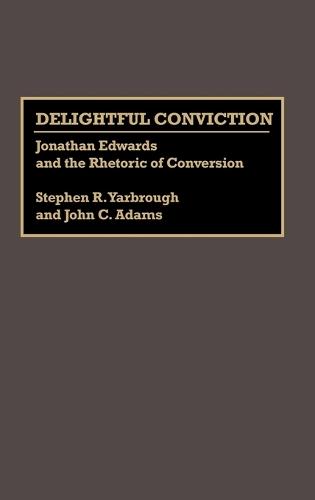Full Product Details
Author: John C. Adams ,
Stephen R. Yarbrough ,
Bernard K. Duffy
Publisher: Bloomsbury Publishing Plc
Imprint: Greenwood Press
Volume: No. 20.
Dimensions:
Width: 15.20cm
, Height: 1.50cm
, Length: 22.90cm
Weight: 0.472kg
ISBN: 9780313275821
ISBN 10: 0313275823
Pages: 208
Publication Date: 03 February 1993
Recommended Age: From 7 to 17 years
Audience:
College/higher education
,
Professional and scholarly
,
Undergraduate
,
Postgraduate, Research & Scholarly
Format: Hardback
Publisher's Status: Active
Availability: Manufactured on demand

We will order this item for you from a manufactured on demand supplier.
Reviews
"?Delightful Conviction succeeds where less in-depth works have failed; that is, while exploring the rich heritage of Edwardsean legacy, the authors have also found a way to make their study more than a history lesson. Their analysis of Edward's rhetorical practice provides insights into the discourse of a past age. Their theoretical discussions, particularly the link with postmodernity, may help to inform discourse in the age to come.?-Quarterly Journal of Speech ""Delightful Conviction succeeds where less in-depth works have failed; that is, while exploring the rich heritage of Edwardsean legacy, the authors have also found a way to make their study more than a history lesson. Their analysis of Edward's rhetorical practice provides insights into the discourse of a past age. Their theoretical discussions, particularly the link with postmodernity, may help to inform discourse in the age to come.""-Quarterly Journal of Speech"
?Delightful Conviction succeeds where less in-depth works have failed; that is, while exploring the rich heritage of Edwardsean legacy, the authors have also found a way to make their study more than a history lesson. Their analysis of Edward's rhetorical practice provides insights into the discourse of a past age. Their theoretical discussions, particularly the link with postmodernity, may help to inform discourse in the age to come.?-Quarterly Journal of Speech
?Delightful Conviction succeeds where less in-depth works have failed; that is, while exploring the rich heritage of Edwardsean legacy, the authors have also found a way to make their study more than a history lesson. Their analysis of Edward's rhetorical practice provides insights into the discourse of a past age. Their theoretical discussions, particularly the link with postmodernity, may help to inform discourse in the age to come.?-Quarterly Journal of Speech Delightful Conviction succeeds where less in-depth works have failed; that is, while exploring the rich heritage of Edwardsean legacy, the authors have also found a way to make their study more than a history lesson. Their analysis of Edward's rhetorical practice provides insights into the discourse of a past age. Their theoretical discussions, particularly the link with postmodernity, may help to inform discourse in the age to come. -Quarterly Journal of Speech
Delightful Conviction succeeds where less in-depth works have failed; that is, while exploring the rich heritage of Edwardsean legacy, the authors have also found a way to make their study more than a history lesson. Their analysis of Edward's rhetorical practice provides insights into the discourse of a past age. Their theoretical discussions, particularly the link with postmodernity, may help to inform discourse in the age to come. -Quarterly Journal of Speech ?Delightful Conviction succeeds where less in-depth works have failed; that is, while exploring the rich heritage of Edwardsean legacy, the authors have also found a way to make their study more than a history lesson. Their analysis of Edward's rhetorical practice provides insights into the discourse of a past age. Their theoretical discussions, particularly the link with postmodernity, may help to inform discourse in the age to come.?-Quarterly Journal of Speech
Author Information
STEPHEN R. YARBROUGH, Associate Professor of English, Skidmore College, has written at length on critical theory and American literature. JOHN C. ADAMS, Associate Professor of the Department of Speech Communication, Syracuse University, has written many articles for professional journals on American rhetoric and the history of public address.




